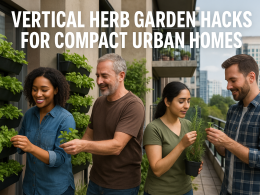Avoid These 5 Common First-Time Kitchen Garden Errors
Introduction: Planting the Seeds of Success
Starting your first kitchen garden is an exciting venture. The prospect of growing your own fresh produce can be incredibly rewarding. However, like any new endeavor, it comes with its share of challenges, especially if you’re a first-timer. In this article, we’ll explore five common mistakes that novice kitchen gardeners often make and provide insights from organic gardening expert Fergus Garrett on how to avoid them. Let’s plant the seeds of success together.
Error 1: Neglecting Soil Health
The Foundation of a Thriving Garden
One of the most common errors beginners make is not paying enough attention to the health of their garden soil. Fergus Garrett emphasizes the importance of soil health in organic gardening.
Table: Soil Health Tips for Beginners
| Tip | Description |
|---|---|
| Soil Testing | Get your soil tested to understand its composition. |
| Organic Matter | Add compost or organic matter to improve fertility. |
| pH Balance | Maintain the right pH level for your crops. |
| Mulching | Apply mulch to conserve moisture and control weeds. |
Error 2: Overcrowding Plants
Overcrowding plants in your garden is a common mistake that can have detrimental consequences. When plants are too close together, they compete for essential resources like sunlight, water, and nutrients, often resulting in stunted growth and reduced yields. Additionally, overcrowding restricts airflow between plants, creating a conducive environment for diseases and pests to thrive. Untangling overcrowded roots can be challenging and may harm the plants during transplanting. Proper spacing allows each plant to access the resources it needs, promoting healthier growth and a more bountiful harvest. It also makes it easier to tend to your garden, preventing difficulties in tasks like weeding and harvesting. By giving your plants adequate space, you ensure their overall health and productivity, contributing to a thriving garden.

Error 3: Neglecting Pest Management
Neglecting pest management in your garden can lead to severe damage to your plants. Pests can quickly multiply and wreak havoc on your crops, potentially ruining your harvest. Implementing effective pest management strategies, such as companion planting or attracting beneficial insects, is essential to protect your garden’s health and yield. Ignoring pest control measures may result in increased plant stress and diminished overall garden productivity. Regular monitoring and timely action are key to preventing pest-related issues and maintaining a thriving garden.
Error 4: Inadequate Watering
Inconsistent or inadequate watering is a frequent error among new gardeners. Fergus Garrett highlights the importance of proper watering techniques:
Table: Watering Tips for Healthy Crops
| Tip | Description |
|---|---|
| Watering Schedule | Establish a regular watering schedule. |
| Watering Depth | Water deeply to encourage deep root growth. |
| Mulching | Apply mulch to retain soil moisture. |
| Avoid Overhead Watering | Water at the base of plants to prevent fungal issues. |
To avoid this mistake, create a regular watering schedule, ensuring that you water deeply to encourage deep root growth. Mulching can help retain soil moisture, and it’s best to water at the base of plants to prevent fungal issues.

Error 5: Skipping Regular Maintenance
Nurturing Your Garden Continuously
Lastly, neglecting regular garden maintenance is a common oversight. Fergus Garrett stresses the importance of ongoing care:
Table: Maintenance Checklist for Kitchen Gardens
| Task | Description |
|---|---|
| Weeding | Regularly remove weeds to reduce competition for nutrients. |
| Pruning | Prune plants to encourage healthy growth. |
| Soil Amendments | Replenish soil with compost or organic matter. |
| Crop Rotation | Rotate crops to prevent soil depletion and pest buildup. |
To prevent this error, create a maintenance checklist. Regularly weed your garden, prune plants as needed, amend the soil with compost, and practice crop rotation to maintain soil health.
Conclusion: A Thriving Kitchen Garden
As you embark on your journey of kitchen gardening, remember that mistakes are part of the learning process. By being aware of common errors and following the insights of organic gardening expert Fergus Garrett, you can set the foundation for a thriving kitchen garden. With patience, dedication, and a little green thumb, your garden will flourish, providing you with fresh and delicious produce . kitchen garden is an art that requires both knowledge and dedication. With the invaluable insights from Fergus Garrett, we’ve explored the essential elements that contribute to a flourishing garden. From prioritizing soil health to avoiding common mistakes, the path to a thriving kitchen garden is now clearer. Fergus Garrett’s wisdom in organic gardening has shed light on the importance of sustainability, the taste and health benefits of organic produce, the vitality of soil and ecosystems, and the peace of mind that comes with chemical-free gardening.










